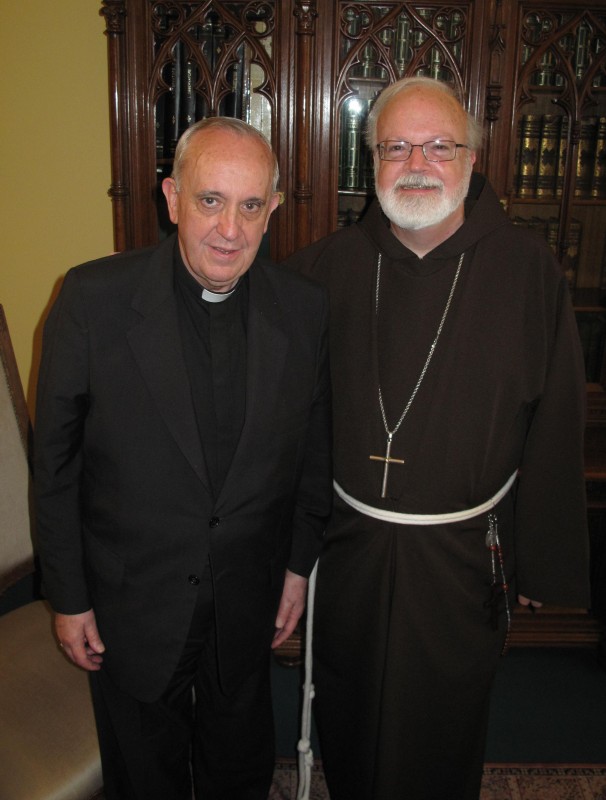A Young Sean O’Malley Spoke Out Against Argentina’s ‘Dirty War’

Cardinal Jorge Bergoglio (now Pope Francis I) and Cardinal Sean O’Malley in Buenos Aires, Argentina, in 2010. Photo via The Pilot, CardinalSeansBlog.org
Last week, after the papal conclave elected Cardinal Jorge Mario Bergoglio as the new Catholic pope—he chose the name Pope Francis I—speculation mounted about Bergoglio’s role in Argentina’s Dirty War. During the late 1970s and early 1980s, the Argentinian military junta “disappeared” somewhere between 9,000 and 30,000 suspected Communists and “subversives.” The reign of terror that was at least tacitly condoned by some members of the Catholic hierarchy. Here’s Jon Lee Anderson of the New Yorker on Bergoglio’s role:
The key allegation against him is that he pointed out left-leaning priests to the military as dissidents, leaving them exposed, and that he did not defend two kidnapped clerics or ask for their release. He has denied this, and says instead that he protected priests and others—just quietly, in secret.
The Catholic Church, naturally, has rejected all the charges. Meanwhile, Adolfo Perez Esquivel, who won the 1980 Nobel Peace Prize for his role as a rights activist during the war, is defending the new Pope, telling the BBC: “There is no link between [the Pope] and the dictatorship.” As for the two kidnapped priests: One of them, Orlando Yorio, criticized Bergoglio for failing to provide any help (Yorio died in 2000). The other, Francisco Jalics, has “reconciled” with the new Pope.
Interestingly enough, one Catholic priest who did speak out against the atrocities in Argentina at the time was a young priest named Sean O’Malley—now the Cardinal of the Archdiocese of Boston, and the subject of papal speculation in the weeks leading up to the papal conclave. In May 1979, O’Malley, then a priest in Washington, D.C., presided over a Mass for Argentina’s Independence Day at the Cathedral of St. Matthew. Facing an audience filled with members of the Argentine military junta, O’Malley castigated the country’s human rights violations and disappearances, equating them to the biblical slaughter of the innocents by Herod. Outraged, the Argentinian military members stood up and walked out. As Colman McCarthy wrote in a Washington Post column at the time:
The Argentine exodus took but a few minutes. With one high-ranking general leaving first, the underlings followed. In the pulpit the priest kept to his text.
Outside, the military men were damning him for “turning a religious event into a political one.”
Another of the white-suited contingent, looking as furious as St. George hot to slay a dragon, said that “priests have no place in politics. He should have given a sermon on another subject, like the love of God.”
According to McCarthy, O’Malley’s strong sermon was preceded by the pre-Mass testimony of another young priest, Rev. Patrick Rice, an Irish missionary who had been imprisoned and tortured for two months by the junta. (Rice also talked of priest friends who disappeared, though it seems they were not Yorio or Jalics).
O’Malley’s contentious sermon was deemed notable and powerful enough that in addition to the Washington Post column, it merited a followup in Sojourner magazine, as well as a mention—two decades later—in Walter J. Burghardt’s book, “Christ in Ten Thousand Places: Homilies Toward a New Millennium.” (Rice, for his part, later left the priesthood and worked with the International Coalition Against Enforced Disappearances, before dying in 2010.)
I first heard the O’Malley/Argentina story while reporting “Resurrection,” my story on the recovery of St. John’s Seminary. At the ordination of new priests for the Archdiocese of Boston, O’Malley told a self-deprecating version of the “memorable sermon” (watch it here, starting at around 29:45):
“I looked up about halfway through my sermon and saw that the church was emptying out. Hundreds of people were rushing towards the door. I would have liked to have thought that they were all going to the bathroom at the same time, but I realized that that was not the case. And I thought to myself, Well, when I leave this Mass, I’ll probably go right to the airport and be on the next plane to Papua New Guinea when the bishop finds out. However, I was relieved when Cardinal Baum found out and he said, ‘Well, when Father Sean preaches, make sure that you take up the collection before the gospel.’”
(The ordination audience thought that last line was pretty hilarious; the story, for its part, neatly encapsulates O’Malley’s disposition—serious and thoughtful, but with a dry wit.)
O’Malley’s face-to-face criticism of the junta was brave at the time, and perhaps an early sign of his later willingness to confront hard problems like the sexual abuse scandal. But, to be fair, he was speaking from the safety of Washington, while Bergoglio was in the midst of the war. Undoubtedly, we’ll learn more about Bergoglio’s role in the weeks ahead—maybe he did all that he could, maybe he didn’t. But regardless of his actions, one thing is clear: Bergoglio failed to speak out against the junta.
Pope Francis doesn’t have that luxury. The Catholic Church has been too damaged by scandal and declining membership to remain silent. If he wants to save his church, he has to speak out—especially if that means criticizing the very Church he’s leading.


